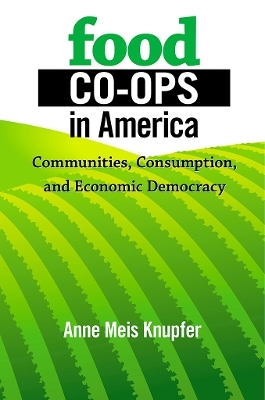
Food Co-ops in America
Cornell University Press (Verlag)
978-0-8014-5114-0 (ISBN)
- Lieferbar (Termin unbekannt)
- Versandkostenfrei
- Auch auf Rechnung
- Artikel merken
In recent years, American shoppers have become more conscious of their food choices and have increasingly turned to CSAs, farmers’ markets, organic foods in supermarkets, and to joining and forming new food co-ops. In fact, food co-ops have been a viable food source, as well as a means of collective and democratic ownership, for nearly 180 years.
In Food Co-ops in America, Anne Meis Knupfer examines the economic and democratic ideals of food cooperatives. She shows readers what the histories of food co-ops can tell us about our rights as consumers, how we can practice democracy and community, and how we might do business differently. In the first history of food co-ops in the United States, Knupfer draws on newsletters, correspondence, newspaper coverage, and board meeting minutes, as well as visits to food co-ops around the country, where she listened to managers, board members, workers, and members.
What possibilities for change—be they economic, political, environmental or social—might food co-ops offer to their members, communities, and the globalized world? Food co-ops have long advocated for consumer legislation, accurate product labeling, and environmental protection. Food co-ops have many constituents—members, workers, board members, local and even global producers—making the process of collective decision-making complex and often difficult. Even so, food co-ops offer us a viable alternative to corporate capitalism. In recent years, committed co-ops have expanded their social vision to improve access to healthy food for all by helping to establish food co-ops in poorer communities.
Anne Meis Knupfer is Professor of Cultural Foundations at Purdue University. She is the author of three books, including The Chicago Black Renaissance and Women’s Activism, and coeditor most recently of The Educational Work of Women’s Organizations, 1890–1960. Half of the royalties from Food Co-ops in America are going to Food Co-op Initiative, which assists poorer communities in starting food co-ops. Their website is: http://www.foodcoopinitiative.coop/.
Introduction: A Democratic Impulse1. Food Cooperatives before the Great DepressionPart I. Collective Visions of the Depression
2. Food Cooperatives, 1930s–1950s
3. Ithaca Consumer Co-operative Society
4. The Hyde Park Co-operative Society
5. Hanover Consumer Co-operative Society
6. Adamant Food Co-operative and Putney Food Co-operativePart II. Food for People or Profit?
7. Food Cooperatives, 1960s–1990s
8. North Coast Co-operatives in Arcata, Eureka, and Fortuna
9. New Pioneer Co-operative Society
10. Cooperatives in the Twin CitiesEpilogue: The Age of the "Organic-Industrial Complex"Appendix: Website Sources about Food CooperativesNotes
Bibliography
Index
| Zusatzinfo | 7 Halftones, black and white |
|---|---|
| Verlagsort | Ithaca |
| Sprache | englisch |
| Maße | 155 x 235 mm |
| Gewicht | 907 g |
| Themenwelt | Geisteswissenschaften ► Geschichte ► Regional- / Ländergeschichte |
| Sozialwissenschaften ► Soziologie | |
| Wirtschaft ► Betriebswirtschaft / Management | |
| Wirtschaft ► Volkswirtschaftslehre | |
| ISBN-10 | 0-8014-5114-0 / 0801451140 |
| ISBN-13 | 978-0-8014-5114-0 / 9780801451140 |
| Zustand | Neuware |
| Haben Sie eine Frage zum Produkt? |
aus dem Bereich


